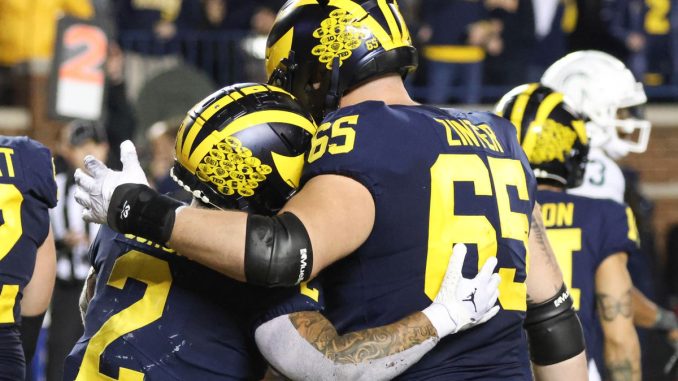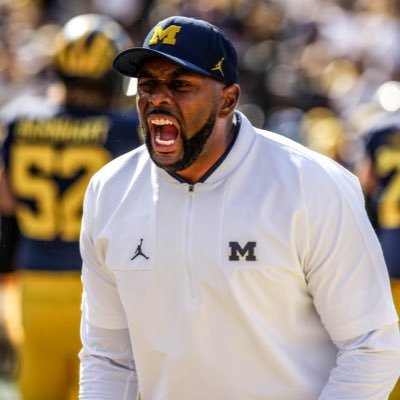
PAINFUL EXIT: I won’t stay, I want to leave, another Wolverines top hero makes decisions on his future
Michigan football’s Sherrone Moore has risen quickly through the coaching ranks, earning promotions from tight ends coach to offensive line coach to offensive coordinator to…
Michigan football’s Sherrone Moore has risen quickly through the coaching ranks, earning promotions from tight ends coach to offensive line coach to offensive coordinator to head coach within seven years with the Wolverines.
Moore shared some insight into his background as an offensive line coach and how that prepared him to become an offensive coordinator and head coach during a recent session with CoachTube. His presentation focused on Michigan’s two-back running game and how the Wolverines develop it, but Moore began by highlighting his role in developing U-M’s offense.
As the head coach, it’s a little different than being the coordinator and being the offensive line coach. But one thing I take a lot of pride in is that I come from an offensive line background and then got the chance to become an offensive coordinator at a great university, a great place.
And now, being the offensive line coach and being an offensive coordinator, that’s something that not a lot of guys get the opportunity to take that chance and be a head coach. And I know Coach Andy Reid got on here — who’s one of the best to ever do it, one of the best coaches ever in football period — and talked, I believe yesterday. And I got a chance to talk to him when I accepted the job. One thing he said to me was be myself, and Coach Harbaugh told me the same thing. And that’s what I plan to do.
But really I wanted to talk about the transition from being a coach and an assistant coach to being the head coach and the things that change. And then talk a little football too. As the head coach, you don’t do that as much now. You’re more of a CEO of an organization
And I think the cool thing about being an offensive line coach, you get to coach the most guys on the field. I think sometimes you get put in this box. Regardless of who’s watching, who’s on here, I’m always for offensive line coaches getting a chance to be the coordinator and call plays.
As an O-line coach, I’d say to this to young guys that are in the business and if you’re an offensive line coach: Don’t just get stuck in the box of, ‘I only want to do the run game and protection.’ Venture out, learn the passing game, learn how it all ties together, learn what the quarterbacks are doing, the receivers are doing. And put that in your toolbox to help you coach the O-line.
I got my start as a tight end coach. And I think that really helped me build my knowledge of the game. And I don’t know it all by any means, and I continue to learn every day. Once you stop learning, there’s a problem. I think you’ve got to continue to learn every day. But I think a lot of things I did learn helped me when I was a tight end coach.
In 2009 to 2011, I was a GA at Louisville, became the tight ends coach full-time for two seasons. There, Coach Charlie Strong was the head coach. He went to Texas. I wasn’t allowed to go at that time to Texas, so I ended up at Central Michigan. It was a blessing. So, in 2014-17, I was at Central Michigan for four years. I got to Michigan in ’18. I was the tight ends coach through ’20.
And then Coach Harbaugh gave me the opportunity to be the offensive line coach in ’21, became the offensive coordinator, O-line coach, Co-OC in ’22. And then full-time OC in ’23, and the head coach here in ’24. Seasons document what we did the past three years, and very blessed and happy to be a part of what we did.

I think, really, the things that are most important to me are the players. And you go through so many adverse times, so many times and so many things with the players. I think that the biggest piece of this as a coach is you got to figure out how each player learns, each player clicks, each player is different. And just because you’re an O-line coach doesn’t mean you’ve got to yell. It doesn’t mean you’ve got to scream and do different things. I think some guys just learn differently.
From an off-the-field perspective, for me, I took a huge, huge part in mentoring each player and getting to know them, not just as a player, but as a person. I think that’s more important than anything. You’ve got to learn and get to know these guys as people. And then off-the-field, obviously, recruiting the offensive linemen was a huge piece of what I did.
On the field, player development is huge. Coaching five positions, sometimes six, is what we do. We like to have five, six, sometimes seven offensive linemen on the field at the same time. So, you’re coaching that position at a premium. My job on the field as the O-line coach was to create a unit of five that looks as one.
And film break down of the offensive line, the tight ends, the running backs, creating that run game and protection plan was a huge part of what I did as the offensive line coach. And then your responsibilities grow.
But what I tried to do when I was the O-line coach was not only be a part of the run game and the protection plans, but be a part of the passing game and try to figure out ways that we can manipulate defenses, coverages, to continue the knowledge of the passing game stuff because you can’t keep putting yourself in a box.

Leave a Reply